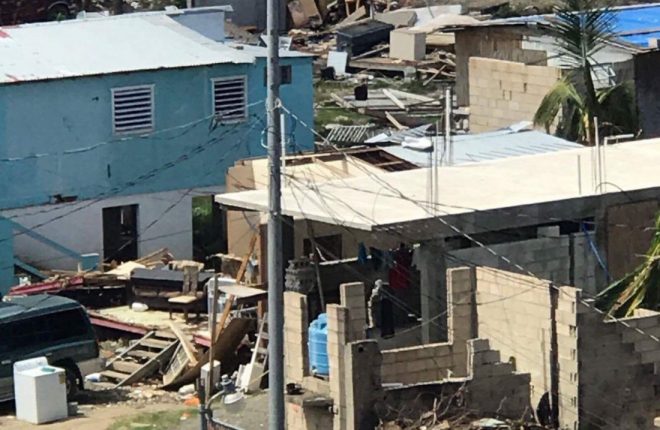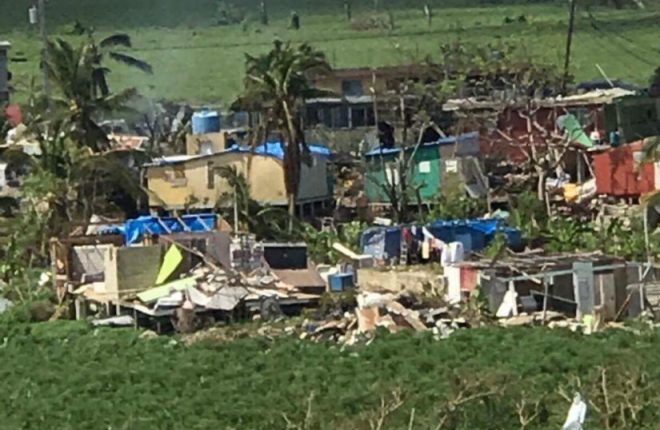
A FAMILY of five have endured a tough few weeks as they have battled with the after math of Hurricane Maria in Puerto Rico. Helena Hession, originally from Mayo and her husband Columba McGarvey, a Teelin native, lived in Mountcharles for years with their three children before uprooting and emigrating to Puerto Rico four and half years ago.
Speaking to the Donegal News, Helena said because she is a qualified meteorologist, she always thought she would have liked to experience a hurricane, until one actually stormed through her neighbourhood. On September 7th 2017, Hurricane Irma skirted past the island of Puerto Rico. This devastated some other Caribbean islands and Puerto Rico became a relief centre for many of these, only to be hit by Maria two weeks later on September 20th.
The category four hurricane sustained wind speeds of up to 155mph, just 2mph short of a category five status. “The storm itself was a scary experience but at no point did I fear for my life. We were lucky in that our house is strong, hurricane proof and the most we had to deal with was flooding which we were able to get under control until it passed. The aftermath is actually far more difficult.” Helena explained.

Helena Hession lived in Mountcharles for years with her husband and three children, before they moved to Puerto Rico four and a half years ago.
“Only 10% of the population have had power restored and water has been restored to about 40% but it is contaminated. People cannot boil it because they have no power. Bottled water is scarce. Many shops don’t have it and ones that do have queues that are hours long. It’s the same with petrol stations. Initially lines were seven or eight hours long because they were giving out only $20 of petrol to ration it. It has improved now and maybe takes thirty minutes.
“80% of communication networks are down so it is hard to communicate and services that are operating cannot take credit or debit cards so cash has become an issue and again there are three or four hour lines at ATMs.”
Describing it as a ‘humanitarian crisis’ Helena said that while her family are safe and well, other families haven’t been as fortunate and that the country need immediate help. “Personally we have a small generator which we use to power our fridge and freezer and some fans during the day. At night we have one bedroom with air conditioning which for a family of five is pretty cosy, but we can’t complain, it is still a lot more than most.
“Unfortunately that wasn’t the case in the poorer more rural communities where entire houses were blown or washed away. There are still in excess of 6000 people living in shelters which were set up in public schools and this is three weeks later.”

Helena went on to explain how weeks on, there are parts of the island who still have not received supplies. The death toll is currently at 45, but expected to climb much higher as there are areas of the island that still not have been reached. “There has been an outbreak of Leptospirosis (Weils Disease) due to contaminated water. The lack of power in water treatment plants, dead animals, flooding and clogged drains are causing this. Today there is also word of cholera in some hospitals.
“The hospitals are a mess, many don’t have power. I know a pregnant 18 year old girl who went into labour at 34 weeks due to dehydration. They managed to stop it at the hospital but then she was discharged, as they had no room for her but she lost her home, everything she had bought for her new baby. So a few of us here in my area have managed to put together all the things she needs from stuff we have ourselves and I have bought her nappies, wipes, new born clothes etc. But she is sleeping on the tiled floor at a friends house with a tiny battery powered fan beside her. It’s inhumane.
“There is a humanitarian crisis. For some reason aid is not getting out to the people that need it most.” Helena added.
Looking to the future, Helena said while they are a long way away from going back to life as they knew it, they are grateful for what they still have. “We have a new normality, a different routine, a different way of life which we had taken for granted. We have learned that washing in cold water is not that bad, at least we have a roof over our heads or having freshly clean, ironed clothes every day is a luxury we can live without.”
She concluded by praising the Puerto Rican people, calling them a ‘resilient race’ and said the communities in her area have came together to help one another more so than ever. “The camaraderie that I’ve experienced; neighbours out with there machetes helping to clear the roads, sharing food and water that is scarce, people volunteering on the relief process is amazing and has brought out the best in people.”
If you would like to donate to the people of Puerto Rico please visit https://www.gofundme.com/humanitarian-relief-for-puerto-rico.









